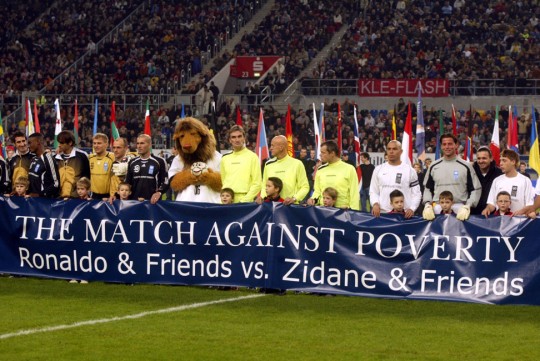Horn of Africa the biggest winner at UN charity soccer match
Horn of Africa the biggest winner at UN charity soccer match

The annual Match Against Poverty, which brings together dozens of soccer stars and United Nations Goodwill Ambassadors to spotlight the UN’s efforts to achieve the Millennium Development Goals (MDGs) and help people in need, turned into an on-field goalfest today.
An all-star team led by Brazil’s Ronaldo and France’s Zinédine Zidane, both Goodwill Ambassadors and previous World Cup champions, edged out another all-star team from Hamburger Sport-Verein (HSV) 5-4.
But there was another winner. The match, played in Hamburg’s Imtech Arena this evening, drew a capacity crowd and is expected to raise hundreds of thousands of dollars for this year’s focus – tackling the ongoing food crisis across the Horn of Africa, which has left an estimated 13 million people in the region dependent on humanitarian assistance.
Before the game, Mr. Zidane stressed that the match was “much more than a game: it is part of the global fight against poverty.”
This year’s participants included a series of current and former star players, such as Didier Drogba of Cote d’Ivoire, Italy’s Fabio Cannavaro and Portugal’s Luis Figo.
Mr. Drogba, making his debut in the Match Against Poverty, said he was honoured to participate.
“I encourage everyone to pull together to end this crisis,” he said.
The UN Development Programme (UNDP), which will receive two thirds of the match proceeds, has said it will use them to bolster humanitarian efforts in Djibouti, Ethiopia, Kenya and Somalia, where the UN is providing food, water, shelter and health services to those afflicted.
Proceeds from previous Matches Against Poverty – there have been nine in total – have benefited projects in more than 27 developing countries, including recovery efforts in the wake of the 2010 Haiti earthquake and last year’s devastating floods in Pakistan.
###
About United Nations Development Programme (UNDP)

Since 1966, the United Nations Development Programme (UNDP) has been partnering with people at all levels of society to help build nations that can withstand crisis and drive and sustain the kind of growth that improves the quality of live for everyone. UNDP works in four main areas: poverty reduction and achieving the Millennium Development Goals (MDGs); democratic governance; crisis prevention and recovery; environment and sustainable development.
UNDP is the United Nations’ global development network, an organization advocating for change and connecting countries to knowledge, experience and resources to help people build a better life. We are on the ground in 177 countries, working with them on their own solutions to global and national development challenges. As they develop local capacity, they draw on the people of UNDP and our wide range of partners.
World leaders have pledged to achieve the Millennium Development Goals, including the overarching goal of cutting poverty in half by 2015. UNDP’s network links and coordinates global and national efforts to reach these Goals.
Our focus is helping countries build and share solutions to the challenges of:
- Fighting poverty
- Building democratic societies
- Preventing crisis, enabling recovery
- Protecting the environment
- Halting & reversing HIV/AIDS
- Empowering women
- Growing national capacity
UNDP helps developing countries attract and use aid effectively. In all our activities, we encourage the protection of human rights, capacity development and the empowerment of women.
More at: www.undp.org
###
> United Nations (UN).
 The United Nations was established on 24 October 1945 by 51 countries committed to preserving peace through international cooperation and collective security. Today, nearly every nation in the world belongs to the UN: membership totals 192 countries.
The United Nations was established on 24 October 1945 by 51 countries committed to preserving peace through international cooperation and collective security. Today, nearly every nation in the world belongs to the UN: membership totals 192 countries.
When States become Members of the United Nations, they agree to accept the obligations of the UN Charter, an international treaty that sets out basic principles of international relations. According to the Charter, the UN has four purposes:
- to maintain international peace and security;
- to develop friendly relations among nations;
- to cooperate in solving international problems and in promoting respect for human rights;
- and to be a centre for harmonizing the actions of nations.
###
* The above story is adapted from materials provided by United Nations (UN)
** More information at United Nations (UN)



















